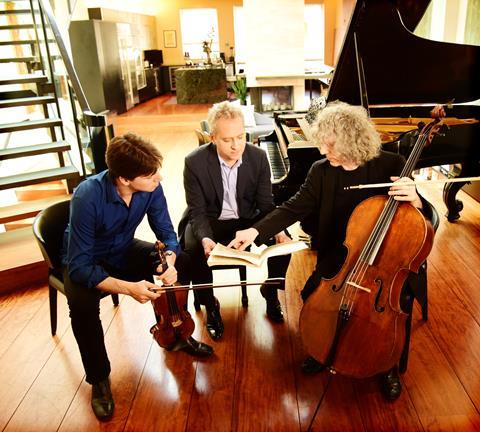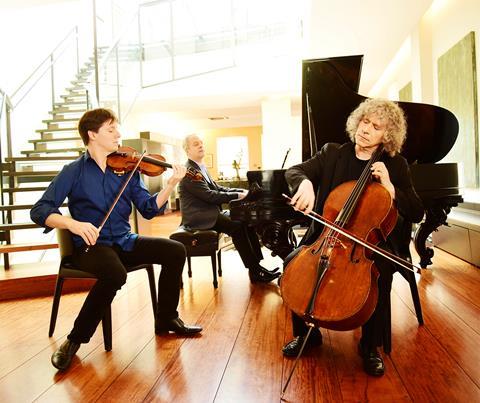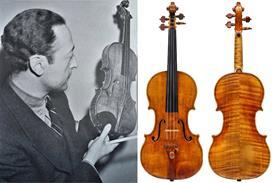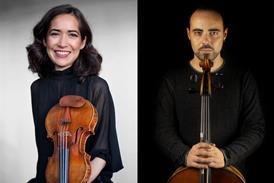US correspondent Thomas May interviews violinist Joshua Bell and cellist Steven Isserlis on their new album of Mendelssohn’s piano trios, which they recorded together with their longtime colleague, pianist Jeremy Denk, for Sony Classical

Discover more Featured Stories like this in The Strad Playing Hub
Joshua Bell, Steven Isserlis and Jeremy Denk have collaborated for decades. Their new release of Felix Mendelssohn’s piano trios, however, marks a first for their partnership. Until now, they had never recorded these remarkable works – the first of which, the D minor Trio, prompted Robert Schumann to anoint his colleague ‘the Mozart of the nineteenth century, the brightest among musicians…’, as Isserlis points out in his eloquent liner notes. Still, the performances here make it obvious that these are musicians who feel an intensely close bond with Mendelssohn.
Indeed, Bell’s debut concerto album (made in 1986 with the Academy of St Martin-in-the-Fields and Sir Neville Marriner and released in 1988) included the composer’s Violin Concerto, a work for which he has also written his own cadenza. Isserlis can even claim a familial relationship, noting that Mendelssohn is ‘my 18th cousin many times removed’.
Mendelssohn: Piano Trios follows on their acclaimed For the Love of Brahms album from 2016, also for Sony Classical.
Bell and Isserlis shared their thoughts about the album shortly before its digital release.
What are some aspects you find particularly compelling about Mendelssohn’s piano trios?
Joshua Bell: I have felt a personal connection to Mendelssohn since I first discovered the Octet as a teenager. I think it’s one of the greatest pieces ever written. But these trios are much more mature and go to greater depths. I was more familiar with the D minor Trio, which of course is the one that’s performed more often. I’ve also been doing that since I was a teenager. I came to the C minor Trio later in life, and that one goes even deeper. You can only wonder where he would have gone if he had made it into his 40s. Certainly these pieces of chamber music are as great as anything ever written for the instruments.
Steven Isserlis: I love the passion, the melodiousness, the emotional journeys, the perfection of form — actually, there’s no aspect to these trios that I don’t admire!
Joshua Bell: The scherzo movements of both of these trios are such gems on their own, full of witticism and bouncing with such joy. But he follows that with an incredible depth and darkness in the slow movements of both trios that make for an incredible contrast. I think this music dispels the idea that Mendelssohn is a ‘light’ composer. He also never disappoints in the excitement department when he builds an ending. You always feel so satisfied with these pieces.
Mendelssohn played violin and viola at a very young age but, like Mozart, gravitated toward the piano. What strikes you about the roles he assigns the string instruments in these trios?
Steven Isserlis: The cello is actually pretty independent in these trios – more so than in, say, Schumann’s magnificent trios, written shortly afterwards. Many of the most beautiful melodies are first presented by the cello.
‘Mendelssohn’s writing is always perfectly balanced between the lower and higher registers and the string crossings. Everything always fits’ – Joshua Bell
Joshua Bell: There’s something about the perfection of the balance between the instruments and the piano writing. It’s almost unfathomable how Mendelssohn could write for the piano so effortlessly. But that’s just as well the case for the violin — unlike, for instance, the Schumann trios, which I adore, but which are harder physically to navigate. With Schumann, it often feels like you’re going against the grain physically on the instrument. Mendelssohn never feels like that but is always perfectly balanced between the lower and higher registers and the string crossings. Everything always fits. I think Steven and I have a similar approach to the varied use of vibrato and how to approach sound, depending on what’s required. So I think our sounds can blend well.
Why do you think Mendelssohn had such an especially hard time composing these piano trios? Did something about the genre make him even more self-critical than usual?
Steven Isserlis: Well, I think that Mendelssohn often had quite a hard time composing — the image of him as a facile song-without-words-smith is wildly inaccurate. There are several ‘original versions’ of his pieces — the Violin Concerto, for instance — and some of his finest works, such as the ‘Italian’ Symphony and the B flat major String Quintet, remained unpublished during his lifetime. He was a perfectionist!
Speaking of ‘original versions’, Mendelssohn wasn’t satisfied until he’d rewritten the first of his piano trios. A special bonus of this new album is your inclusion of the first version Mendelssohn wrote of the slow movement of op.49 in D minor. Why did you decide it was worth revisiting this Andante con moto tranquillo in its original version?
Steven Isserlis: Although of course the revised version is superior – no question – there are a few little harmonic ‘moments’ in the original that had to be cut out, but were very lovely in themselves. It’s also so interesting to see the composer at work – for example, how he initially began the movement with a conventional accompanying figure, instead of launching straight into the opening subject.
‘We’re friends, and we respect each other – that’s why we play together’ – Steven Isserlis
It’s no hype to refer to the casting here as a ‘dream team’: both of you have performed together — as well as with Jeremy Denk — for many years. How do you resolve interpretive questions among yourselves?
Steven Isserlis: We talk, we argue – and then we play! Just a couple of days ago, I saw the conductor Jane Glover, with whom the three of us recently performed the Beethoven Triple Concerto in Aspen. She was reminiscing about our first meeting together, before the first orchestral rehearsal. She admitted that she couldn’t believe the amount of bickering that went on! ‘But then you played – and all was fine’, she recalled – with relief!. But we’re friends, and we respect each other – that’s why we play together.
Joshua Bell: For me, that long relationship makes a big difference. You might not get another chance to record this repertoire, so you want to wait until you really do have your own ‘dream team’. Because of the experience we’ve had together, we’re similar enough in our approach that we share very basic ideals, yet different enough that there’s never a shortage for me of being inspired by new ways of thinking from both Steven and Jeremy. That creates some arguments – in the best sense of the word, which stimulate creativity.
Was there anything unusual or noteworthy about this recording process?
Steven Isserlis: Well, for me it was unusual, because it was at a posh recording studio in LA, sandwiched between two concerts in the area during our US tour. Most of my recordings have been made in the UK, to less tight schedules.
We were lucky to have the wonderful producer Adam Abeshouse working with us – a benign and perceptive presence. We worked for long days, recording for several hours at a stretch, until Jeremy would call out: ‘Hangry alert!’ – at which point we’d stop and get something to eat. But – despite a few difficult moments, which one almost invariably experiences during recording sessions – it was fun; and, despite my misgivings when Josh first suggested the idea, I think we were all very glad we’d done it.
Joshua Bell: The recording never felt like we had worked out exactly how we would do everything in advance. Jeremy was always keeping us on our toes and was never the same from take to take. The editing process made it very difficult to choose between some of these very different ways of looking at the music.
It helps to play with musicians like this who give so much creative stamina that even if you think you’re getting tired it keeps you going – like running a marathon with other good runners.
As far as all of my albums of chamber music go, I feel this is the one to date that we’ve recorded the way I’d like to be remembered.
Mendelssohn: Piano Trios is available now for digital release on Sony Classical, with physical release on 25 October 2024.

Read: Joshua Bell on playing the ‘Huberman’ Stradivari violin
Listen: The Strad Podcast: How to practise effectively with violinist Ray Chen
Read: Seattle Symphony announces violin and viola appointments
The number one source for playing and teaching books, guides, CDs, calendars and back issues of the magazine.
In The Best of Technique you’ll discover the top playing tips of the world’s leading string players and teachers. It’s packed full of exercises for students, plus examples from the standard repertoire to show you how to integrate the technique into your playing.
The Strad’s Masterclass series brings together the finest string players with some of the greatest string works ever written. Always one of our most popular sections, Masterclass has been an invaluable aid to aspiring soloists, chamber musicians and string teachers since the 1990s.
American collector David L. Fulton amassed one of the 20th century’s finest collections of stringed instruments. This year’s calendar pays tribute to some of these priceless treasures, including Yehudi Menuhin’s celebrated ‘Lord Wilton’ Guarneri, the Carlo Bergonzi once played by Fritz Kreisler, and four instruments by Antonio Stradivari.






































No comments yet